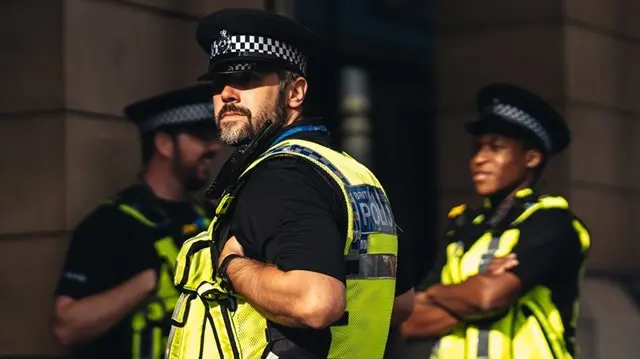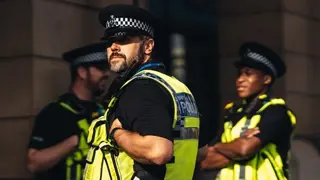
Policing - Level 3 Diploma in Policing (720)
OFQUAL Regulated, Nationaly Recognised, UCAS Points, Tutor Support
APeducation Online
Summary
- Tutor is available to students
Add to basket or enquire
Overview
This RegulatedPolicing qualification aims to provide you with an in-depth understanding of the principles of the police service and will allow you to explore various areas of work within it.
Students can also gain UCAS points with this qualification.
You will develop transferable skills that can be used in the workplace or applied in further study. These include: leadership skills, conflict management, teamwork, navigation, physical fitness, an understanding of personal commitment and equality, diversity and inclusion.
Qualification
Course media
Description
The main objective of this Policing qualification is to allow learners to progress towards the entry requirements of the police service or further study. Its aim is to provide informed and prepared potential recruits.
The qualification has been developed with subject experts to ensure that the content is relevant and meets the needs of employers.
The main outcome of this qualification is progression to employment as it helps you develop knowledge and skills required to prepare for entry to the police service. It can also support you in further study.
Aims of the course
These are to:
- Provide opportunity to investigate career opportunities in the police service
- Understand UK legal systems and the police service
- Gain UCAS Points
- Understand a collaborative approach and the impact of neighbourhood policing
- Understand the use/misuse of substances and alcohol in the context of mental health problems
- Understand the impact of war and conflict on the police service
- Develop an understanding of the personal commitment and fitness requirements needed to be employed in policing
- Develop an understanding of the external organisations that impact on and influence the work of the police service
- Develop an understanding of how the police service responds in emergency situations
- Provide an opportunity to understand and develop the skills and qualities needed to work in the police service e.g., leadership skills, conflict management, personal protection, teamwork and navigation.
Objectives of the course
The objectives of these qualifications are to:
- Allow learners to progress to employment in Policing, further study and towards the entry qualifications and requirements of the police service
- Provide informed and prepared potential recruits.
Structure
The units for this programme have been selected to offer learners the best opportunities for progression both academically and professionally. In order to achieve the Level 3 Diploma Policing (720) learners must 4 mandatory units plus 9 optional units.
Mandatory units are:
- Prepare for a career in the police service
- Develop leadership skills
- Equality, diversity and inclusion
Optional Units:
Learners will be provided with a list of optional units at the time of enrolment to choose from. Learners need to choose 9 optional units to successfully complete this qualification.
Essential skills that learners will gain are:
While completing these qualifications, learners may develop the knowledge, understanding and essential skills employers look for in employees. These range from familiar ‘key skills’ such as team working, independent learning and problem solving, to more tricky-to-measure skills such as:
- An appreciation for appropriate behaviour and dress
- Appropriate interpersonal skills
- Communicating with professional colleagues/peers and/or hierarchical seniors
- Supporting other aspiring employees
- Personal manners and deportment
- Understanding work practices and how different roles and departments function within an organisation.
How the course is delivered
This Level 3 Diploma in Policing (720) is delivered via a Virtual Learning Environment (VLE) which provides access to case studies, learning materials and activities, presentations and web links. Online tutor support and guidance is provided throughout the course, where learners can interact with the tutors, get feedback on their progress and submit their work electronically. This helps you to build the relevant skills progressively, as you receive feedback and support from your tutor during this time. As the course is delivered online, this enables learners to study any time, any place through immediate access to VLE.
Assessment
All units will be internally assessed using a range of methods. This could include direct observation within the workplace, a portfolio of evidence and written assignments.
Requirements
Entry requirements
- Learners must be aged 16 or above
- There are no specific recommended prior learning requirements for this qualification. However, learners may find it helpful if they’ve already achieved a Level 2 qualification.
Career path
Learners who achieve this qualification could progress to:
- Professional Policing BSc (Hons) Protective Services
- Policing Foundation Degree
- Public Service Foundation Degree
Job roles you can apply for on completion
- Professional Policing
- Criminology and Policing
- Criminal Justice
Questions and answers
Hi, how many UCAS points are gained from this course please?
Answer:Hello, Thank you for your enquiry. UCAS points awarded for this qualification as follows: D* = 112, D = 96, M = 64, P = 32. Please do not hesitate to contact us if you need further information. Best wishes, APeducation Online
This was helpful.
Reviews
Currently there are no reviews for this course. Be the first to leave a review.
Legal information
This course is advertised on reed.co.uk by the Course Provider, whose terms and conditions apply. Purchases are made directly from the Course Provider, and as such, content and materials are supplied by the Course Provider directly. Reed is acting as agent and not reseller in relation to this course. Reed's only responsibility is to facilitate your payment for the course. It is your responsibility to review and agree to the Course Provider's terms and conditions and satisfy yourself as to the suitability of the course you intend to purchase. Reed will not have any responsibility for the content of the course and/or associated materials.



